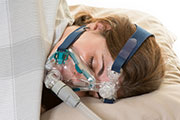Patients with sleep apnea at increased risk for depression, researchers report
FRIDAY, Oct. 2, 2015 (HealthDay News) — Patients with obstructive sleep apnea (OSA) are at increased risk for depression, but continuous positive airway pressure (CPAP) therapy may ease their depression symptoms, a new study suggests. The findings appear in the September issue of the Journal of Clinical Sleep Medicine.
The Australian study included 293 men and women who were newly diagnosed with OSA. Nearly 73 percent had depression when the study began. The worse their apnea, the more severe their depression.
After three months, 4 percent of the 228 OSA patients who used CPAP for an average of at least five hours a night still had clinically significant symptoms of depression. At the start of the study, 41 patients reported suicidal ideation. After three months of CPAP therapy, none of them had persistent suicidal thoughts.
“Effective treatment of OSA resulted in substantial improvement in depressive symptoms, including suicidal ideation,” senior author David Hillman, M.D., said in a journal news release. Hillman is a clinical professor at the University of Western Australia and a sleep physician at the Sir Charles Gairdner Hospital in Perth. “The findings highlight the potential for OSA, a notoriously underdiagnosed condition, to be misdiagnosed as depression,” he added.
Full Text (subscription or payment may be required)
Copyright © 2015 HealthDay. All rights reserved.








